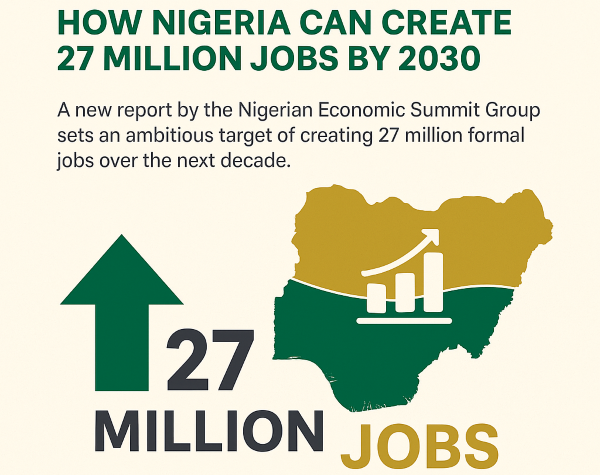NESG Urges FG to Create 27 Million Jobs by 2030 to Sustain Growth, Curb Unemployment

The Nigerian Economic Summit Group (NESG) has called on the Federal Government to commit to an ambitious but necessary goal of creating 27 million new formal jobs by 2030 — equivalent to 4.5 million jobs annually — to safeguard the country’s economic future and prevent unemployment from spiraling out of control.
The group made the call in its new policy report, “From Hustle to Decent Work: Unlocking Jobs and Productivity for Economic Transformation in Nigeria,” unveiled during the 31st Nigerian Economic Summit (NES #31) in Abuja.
The report warns that unless urgent, coordinated action is taken, unemployment and underemployment could double by the end of the decade, trapping millions of Nigerians in low-skilled, low-income, and insecure forms of work.
Nigeria’s Job Crisis: A Structural Development Emergency
According to the NESG, Nigeria’s economy remains largely informal, with most citizens relying on precarious, low-paying jobs for survival. The country’s working-age population is projected to hit 168 million by 2030, placing immense pressure on policymakers to generate sustainable employment opportunities.
“This is no longer just a labour market issue — it is a full-blown development challenge,” said Dr. Wilson Erumebor, Senior Economist at the NESG.
“Without decisive reforms to create decent and productive jobs, an entire generation risks being trapped in vulnerable work that neither lifts families out of poverty nor moves the nation forward.”
The report notes that in 2023, informal jobs accounted for 92.2% of total employment, rising further to 93% in the second quarter of 2024, showing how little progress has been made in formalizing work and boosting productivity.
Erumebor stressed that weak private-sector capacity, poor infrastructure, and overreliance on public-sector employment in some states have left millions without access to secure or well-paying jobs.
The “Nigeria Works Framework”: A Blueprint for Transformation
To address the crisis, the NESG introduced the Nigeria Works Framework, a comprehensive agenda aimed at driving productivity, inclusive growth, and job-led economic transformation.
The framework focuses on six pillars:
- Skills for Productivity — building a workforce aligned with modern industry demands through vocational and digital education.
- Sectoral Engines of Growth — identifying and scaling industries with strong job-multiplying effects such as manufacturing, construction, ICT, and professional services.
- Enterprise-Led Development — empowering small and medium enterprises (SMEs) as the backbone of job creation.
- Upgrading the Informal Economy — formalizing informal activities to enhance earnings, worker protection, and productivity.
- Strengthening Data and Institutions — ensuring reliable employment data and effective labour market governance.
- Promoting Productivity as National Policy — embedding efficiency, innovation, and competitiveness at the heart of Nigeria’s economic planning.
The NESG said the framework serves as a roadmap for policymakers, the private sector, and development partners to create quality jobs and improve living standards over the next decade.
“We need to move from a hustle economy dominated by survivalist activity to one that provides decent work and stable incomes,” the report stated.
“The productivity agenda must become the foundation of national prosperity.”
Key Sectors to Drive Employment Growth
The report identifies manufacturing, construction, ICT, and professional services as the primary growth engines for large-scale employment and productivity expansion.
These sectors, the NESG said, have the potential to absorb millions of youth while enabling the diversification of the economy away from oil dependence.
For instance:
- Manufacturing can generate millions of semi-skilled jobs through agro-processing, textiles, and consumer goods.
- Construction and infrastructure drive short- and medium-term job creation, while also enabling long-term competitiveness.
- ICT and digital services present exponential potential for self-employment, freelancing, and exportable skills.
- Professional services — including finance, logistics, and creative industries — are becoming increasingly vital in Nigeria’s new economy.
From Stabilisation to Job-Led Growth
NESG Chairman, Mr. Niyi Yusuf, said Nigeria’s next phase of reform must move decisively from macroeconomic stabilisation to sustained job creation, productivity, and inclusion.
“The challenge before us is to embed reforms in ways that drive jobs, growth, and inclusion,” Yusuf said.
“These can be achieved while laying the foundation for long-term transformation that secures prosperity for every Nigerian.”
He noted that while the government has made progress in restoring fiscal and monetary stability, economic growth remains non-inclusive, with most Nigerians still locked out of formal employment.
“Stabilisation alone is not enough,” Yusuf added. “We must translate reforms into real jobs, real incomes, and real opportunities.”
Rethinking Job Creation as National Policy
The NESG urged both the Federal and State Governments to prioritise job creation and productivity improvement as central components of national policy — not just as social goals, but as economic imperatives for resilience and stability.
“Job creation is not just about employment; it’s about national competitiveness, social cohesion, and long-term sustainability,” the report stated.
The group called for closer collaboration between the public and private sectors, stronger incentives for businesses to expand hiring, and a renewed commitment to building a skilled, future-ready workforce.
BRANDECONOMY ANALYSIS: From Informality to Inclusion
The NESG’s “Nigeria Works” agenda speaks to one of Nigeria’s most urgent economic paradoxes — high GDP growth with limited job absorption.
For decades, the economy has grown without creating commensurate employment opportunities, leaving the country’s young population dependent on informal and subsistence work.
A shift toward productive employment is essential not just for poverty reduction, but for economic transformation. Nigeria’s demographic advantage — a youth population exceeding 70 million — can either become a growth engine or a social time bomb depending on policy execution.
This makes labour market reform, SME support, and sector diversification the most critical elements of Nigeria’s economic survival plan between now and 2030.
BRANDECONOMY TAKEAWAY
The call to create 27 million jobs by 2030 is more than a statistical target — it is a national survival strategy.
If implemented, the Nigeria Works Framework could unlock unprecedented growth, strengthen productivity, and reposition Nigeria as Africa’s most dynamic labour market.
But success will depend on one factor above all: political will.
A truly inclusive economy must empower enterprise, reward innovation, and prioritise human capital — because Nigeria cannot grow sustainably if Nigerians cannot work productively.











